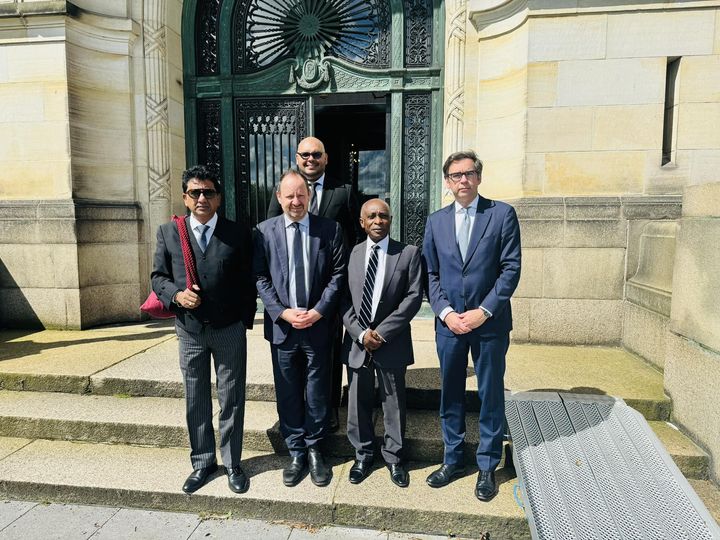BORDER CONTROVERSY: Guyana, Venezuela to submit second round of written pleadings
- Home
- News




BORDER CONTROVERSY: Guyana, Venezuela to submit second round of written pleadings
Attorney General and Minister of Legal Affairs, Anil Nandlall SC MP; Legal Counsel, Philippe Sands; Agent for Guyana at the ICJ, Carl B Greenidge; and Legal Counsel Pierre D’Argent, and Lloyd Gunraj, Chargé d’Affaires at the Embassy of Guyana to the Kingdom of Belgium.
… as hearing proceeds before ICJ
PRESIDENT of the International Court of Justice (ICJ), Judge Nawaf Salam on Tuesday convened a crucial meeting with representatives of Guyana and Venezuela to discuss the next procedural steps in the ongoing controversy over the Arbitral Award of October 3, 1899.
Leading Guyana’s delegation was Attorney General and Minister of Legal Affairs, Anil Nandlall SC MP; Agent for Guyana at the ICJ, Carl B. Greenidge; Philippe Sands and Pierre D’Argent, Legal Counsel; and Lloyd Gunraj, Chargé d’Affaires at the Embassy of Guyana to the Kingdom of Belgium.
Samuel Reinaldo Moncada Acosta, the Agent for Venezuela to the ICJ, led the Venezuelan team, which included a delegation and legal advisers.
According to a release from Nandlall’s Chambers, the focus was on the necessity and timing of a second round of written pleadings, following Venezuela’s submission of its Counter-Memorial on April 8, 2024.
During the meeting, both nations agreed that additional written pleadings were required to advance the case. Guyana suggested a six-month period from the date of Venezuela’s Counter-Memorial submission, setting an initial deadline of October 8, 2024, for its reply.
However, Guyana expressed flexibility in extending this deadline to late October, contingent upon the Court’s schedule.
Venezuela, on the other hand, requested a 12-month period from Guyana’s October reply to prepare its rejoinder, citing the complexity of the case..
“Guyana noted that Venezuela’s request for a 12-month period was excessive, given that the case has been pending for six (6) years and that the subsequent pleadings are not intended to recite facts and legal issues already raised,” the AG chambers said.
The ICJ is now expected to issue an order setting appropriate timelines for the second round of pleadings, taking into account the persuasive arguments made by Guyana’s representatives.
The genesis of the border controversy goes back to the 1899 Arbitral Award, a landmark decision that delineated the boundary between Guyana and Venezuela.
Despite the historic arbitration, tensions have persisted, with Venezuela repeatedly challenging the validity of the award.
In 2018, Guyana took a decisive step by approaching the ICJ, seeking affirmation of the award’s legitimacy.
Venezuela initially claimed that the ICJ lacked jurisdiction, a contention flatly rejected by the World Court in a crucial ruling in December 2020. The door was thus opened for the ICJ to delve into the merits of the substantive case.
Lawmakers aligned with Venezuelan President Nicolas Maduro have approved the creation of a new state “Guayana Esequiba,” in Guyana’s resource-rich Essequibo region. Venezuela, last year, had intensified claims to two-thirds of Guyana’s Essequibo region.
Guyana’s government reiterated its steadfast commitment to the principles of the United Nations Charter, the Rule of Law, and the peaceful settlement of controversies.
However, the country issued a firm warning that it “will not countenance the annexation, seizure, or occupation of any part of its sovereign territory.”
Guyana remains steadfast in its position, asserting that its borders are non-negotiable, and reaffirming its sovereignty over the territory.
Despite ongoing proceedings before the International Court of Justice (ICJ), Venezuela has persisted in asserting its claims to Guyana’s territory, even citing a controversial 2023 December referendum as so-called justification.
The Caribbean Community (CARICOM) recently expressed deep concern over Venezuela’s persistent, “aggressive” stance towards Guyana amid the ongoing border controversy over the Essequibo region.
This issue was a central topic at the 27th meeting of the Council for Foreign and Community Relations (COFCOR), held in Roseau, Dominica, from May 23-24, 2024.
Despite international rulings and diplomatic efforts advocating for a peaceful resolution, Venezuela has continued to escalate tensions.
The bloc noted that Venezuela’s recent actions have undermined these efforts.
At the COFCOR meeting, foreign ministers noted Guyana’s serious concerns regarding the continued military build-up by Venezuela along their shared border.
They highlighted the importance of regional stability and condemned any action that could further inflame the situation.
https://guyanachronicle.com/2024/06/12/border-controversy-guyana-venezuela-to-submit-second-round-of-written-pleadings/